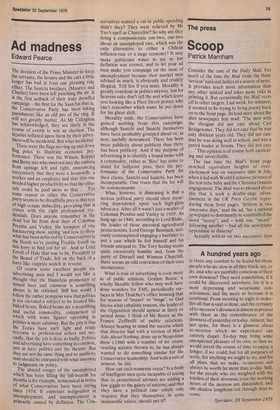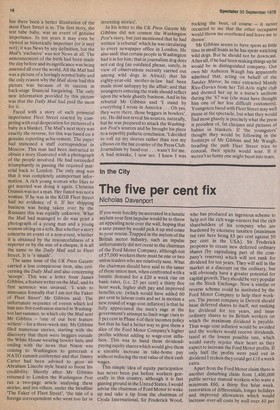The press
Scoop
Patrick M arn ham
Consider the case of the Daily Mail. For much of the time the Mail rivals the three 'serious' national dailies as a source of news. It provides much more information than any other tabloid and takes more risks in printing it. But occasionally the Mail veers off to other targets. Last week, for instance, it seemed to be trying to bring poetry back on to the front page. Its lead story about the shot newspaper boy read: 'The men with the shotgun did not care about Carl Bridgewater. They did not care that he was only thirteen years old. They did not care that he was doing well at school, and was a patrol leader at Scouts. They did not care • . This opinion is of course both nauseating and unverifiable.
The last time the Mail's front page reached equivalent heights of overexcitement was on successive days in July, when it led with World Exclusive pictures of the test tube baby and the Christina Onassis engagement. The Mail was so pleased about this that it took a double-page advertisement in the UK Press Gazette reproducing these front pages. 'Seldom in two successive days,' read the ad, 'has a national newspaper so dominantly re-established the word "scoop"; and — with one "smash" following another — had all the newspaper opposition in disarray'.
Actually seldom on two successive days has there been a better illustration of the mess Fleet Street is in. The first story, the test tube baby, was an event of genuine importance. In ten years it may even be viewed as historically important (or it may not); it was News by any definition, but the Mail's 'exclusive' was not News at all. The announcement of the birth had been made the day before and its significance was being assessed all over the world. All the Mail had was a picture of a boringly normal baby and the only reason why the Mail alone had this picture was because of its success in back-stage financial bargaining. The only new information provided by this picture was that the Daily Mail had paid the most for it.
Faced with a story of such potential importance Fleet Street reacted by competing with real desperation for pictures of a baby in a blanket. The Mail's next story was exactly the reverse, for this was based on a genuine reporting achievement. The paper had stationed a staff correspondent in Moscow. This man had been instructed to obtain a story illustrated with a photograph of the people involved. He had succeeded triumphantly in passing the required material back to London. The only snag was that it was completely unimportant information. A rich young woman who likes to get married was doing it again. Christina Onassis was not a man. Her fiancé was not a woman. If he was in the KGB Fleet Street had no evidence of it. If her shipping business was being taken over by the Russians this was equally unknown. What the Mail had managed to do was print a photograph of a .young man and a young woman sitting on a sofa. But whether a story concerns an event or a non-event, whether it is obtained by the resourcefulness of a reporter or by the size of a cheque, it is all the same to the Daily Mail and to Fleet Street. It is 'a smash'.
The same issue of the UK Press Gazette carried a less conspicuous item, also concerning the Daily Mail and also concerning 'scoops'. This was a letter from James Gibbins, a feature writer on the Mail, and its first sentence was unusual. 'I wish to announce formally that I am not the Faker of Fleet Street' Mr Gibbins said. The unfortunate sequence of events which led him into this confession started in Washington last summer, to which city the Mail sent Mr Gibbins — 'one of our best feature writers' — for a three-week stay. Mr Gibbins filed numerous stories, starting with the discovery that there were beggars outside the White House wearing bowler hats, and ending with the news that Nixon was coming to Washington to gatecrash a NATO summit conference and that Jimmy Carter had been advised to grow an Abraham Lincoln style beard to boost his credibility. Shortly after Mr Gibbins returned to London the Washington Post ran a two-page article analysing these stories, and ten others, under the headline The Faker of Fleet Street', 'the tale of a foreign correspondent who went too far in inventing stories'.
In his letter to the UK Press Gazette Mr Gibbins did not contest the Washington Post's story, but just mentioned that he had written 'a rebuttal' which he was circulating to every newspaper office in London. He also said: that certain people in Washington had it in for him; that in journalism dog does not eat dog (an outdated phrase, surely, in view of observations recently carried out among wild dogs in Africa); that his eighty-year-old mother-in-law had been made most unhappy by the affair; and that youngsters entering the trade should reflect upon the whole ghastly business. And in his rebuttal Mr Gibbins said 'I stand by everything I wrote in America. . . Oh yes, they were there, those beggars in bowlers', etc. He did not reveal his sources, naturally, but he was prepared to attack the Washington Post's sources and he brought his piece to a superbly pathetic conclusion. 'I decided to roll up my sleeves rather than rest my elbows on the bar counter of the Press Club. Journalism by hand-out . . . wasn't for me. A bad mistake, I now see. I knew I was rocking the boat, of course — it never occurred to me that the other occupants would throw me overboard and leave me to drown'.
Mr Gibbins seems to have spent as little time in small boats as he has spent watching wild dogs. But he should not be downcast. After all, if he had been making things up he would be in distinguished company. Our own Mr Auberon Waugh has apparently admitted that, acting on behalf of the Sunday Mirror, he once extracted Mandy Rice-Davies from her Tel-Aviv night club and dressed her up in a nurse's uniform during the '67 war (she must have thought him one of her less difficult customers). Youngsters faced with Fleet Street may well pause at the spectacle, but what they would find most ghastly is precisely what the press is proudest of, fat cheques and pictures of babies in blankets. If 'the youngsters' thought they would be following in the footsteps of Mr Gibbins and Mr Waugh, treading the path Fleet Street tries to conceal, their spirits would soar. If it weren't so funny one might burst into tears.



































 Previous page
Previous page